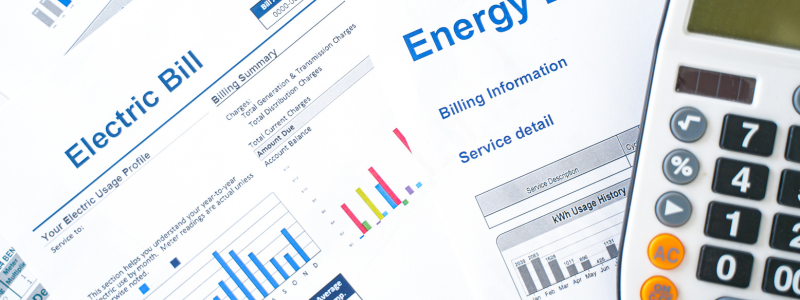Cost of Living: How to Cut Expenses and Save Money
by Paula Eccleston on Jan 8, 2025 4:29:24 PM
Key Summary
The cost-of-living crisis has been impacting people since 2021. The last of the cost-of-living support payments went through in 2024, leaving lots of people unsure of their future money. Here are some top tips to cut down on costs and save money:
- Split up all your payments. Which are essential and which can be cancelled.
- Bring down utility bills by comparing prices and shopping around.
- Meal plan and shop smart. Don't turn up to the shops not knowing what to get. Arrive with a plan and cut out unnecessary expenses.
- Look at ways you can get around for less. Could you use a train every other day instead of driving, helping you save on fuel costs?
- Make the most of discounts and loyalty programmes.
- DIY things that you'd usually have to pay for (painting, hair dressing, fixing broken items).
The cost-of-living-crisis has been ongoing since 2021, with climbing energy prices and increasing cost of groceries.
Even though interest rates are starting to fall, everyday costs remain high. Managing your money effectively is more important than ever.
The last cost-of-living payment went to bank accounts in February 2024. As of January 2025, there are no current plans to provide further cost-of-living payments.
If you need help to reduce your expenses or just want a little extra support during this cost of living period, here are some practical tips to get started and resources to explore.

Tip 1: Review and Analyse Your Spending
Understanding where your money goes is the first step to gaining control over your finances. It may sound simple, but it’s easy to overlook small expenses.
Start by reviewing your income and expenses using a bank statement or banking app. Go through a full month and write down all your spending. Divide these into categories like rent, food, utilities, and non-essentials (entertainment, subscriptions, shopping).
Repeat this exercise for another month with the same essential bills. This will help you see patterns and your average spending.
To make things easier, download our free budget planner here.
Keeping track with budgeting apps
Once you’ve analysed your spending, budgeting apps like Monzo, Emma, and Snoop can help you see where your money is going and identify areas where you can cut back. These apps allow you to separate your money into pots for different expenses, sort bills, and even save. They also highlight your monthly habits.
Keep in mind, though, that some apps charge a subscription fee for their premium features.

Tip 2. Reduce Utility and Household Bills
Groceries don’t have to eat up your budget. With a little planning, you can keep costs low while maintaining a balanced diet.
Energy-saving techniques and smart shopping
- Energy Efficiency: Switch to energy-saving bulbs, unplug devices when not in use, and consider installing a smart thermostat to optimise heating and cooling.
- Shopping Around: Use comparison sites like MoneySuperMarket to compare your bills and potentially find cheaper energy providers.
- Government Schemes: Check if you qualify for energy grants or discounts through schemes like the Warm Home Discount, Cold Weather Payments, or from your local authority, a Household Support payment.

Tip 3. Smart Grocery Shopping and Meal Planning
Food shopping doesn’t have to break the bank. With a bit of planning, you can reduce costs while maintaining a nutritious diet.
Cutting costs without sacrificing nutrition
- Meal Planning: Plan your meals for the week to avoid unnecessary trips to the shop. Use leftovers creatively to reduce waste. Need help? Tesco help you meal plan and creatively use leftovers here.
- Own-Brand Alternatives: Swap branded goods for supermarket own-brand products. For inspiration, check out Jack Monroe’s cookbook, which explains how she fed herself and her son for just £10 a week.
- Shop Smart: Look for discounts when buying your normal shop, but there’s also apps like Too Good To Go for meat, veg and sweet treats. Also, avoid shopping when hungry to reduce impulse buys.

Tip 4. Limit Non-Essential Purchases
Online stores make it easy to overspend, especially with tempting offers like free shipping or discounts for spending more. Practising mindful spending can help you stick to your budget.
Practicing mindful spending can help you stick to your budget.
The value of mindfulness in consumerism
- Pause Before Buying: Wait 24 hours before making a non-essential purchase. You might find you don’t really need the item.
- Unsubscribe: Cancel subscriptions you don’t use often and unsubscribe from marketing emails to reduce temptation.

Tip 5. Exploring Affordable Transportation Options
Owning a car involves ongoing costs like maintenance, fuel, and insurance. If these are stretching your finances, consider other options.
Carpooling, public transit, and other alternatives
- Carpooling: Share rides with friends or colleagues to split fuel costs.
- Public Transit: Check for discounts like student or senior travel passes.
- Cycling or Walking: For shorter journeys, consider biking or walking to save money and improve health.

Tip 6. Seek Discounts, Offers, and Loyalty Programmes
Make your money go further by taking advantage of discounts and reward schemes.
How to make your money go further
- Loyalty Cards: Sign up for schemes like Tesco Clubcard, Nectar, or Boots Advantage Card for discounts and points.
- Voucher Sites: Use websites like VoucherCodes or HotUKDeals to find deals.
- Cashback Apps: Earn money back on purchases using apps like TopCashback or Quidco.

Tip 7. DIY Approaches to Common Expenses
You can save a lot of money by learning to do some things yourself. Online tutorials make it easier than ever.
From home maintenance to personal grooming
- Home Maintenance: Small tasks like painting or basic plumbing can be done with YouTube tutorials, however we do advise that you check the credibility of the source and reviews before starting. You can also use Reddit communities to ask others or see how others are fixing things.
- Personal Grooming: Are there things you could do at home? Nails, shaving, or other grooming items could be done at home with a little bit of practice.
- Craft and Repair: Instead of replacing items, fix or repurpose them. For example, turn an old t-shirt into cleaning cloths.
Conclusion: The Journey to Financial Resilience
Saving money doesn’t happen overnight, but small changes can add up to big results over time. Start with these tips, make use of available resources, and take control of your spending. Navigate the cost of living crisis with these tools.
For additional support, check out organisations like Citizens Advice and MoneyHelper. Don’t forget to download our free budget planner here to kickstart your financial journey. These steps can help you manage the cost-of-living crisis and build a brighter financial future.
FAQs: Cost Of Living: How To Cut Expenses And Save Money
How can I reduce my monthly expenses without sacrificing my lifestyle?
Start by taking a good look at where your money’s going each month. Are you paying for subscriptions you don’t really use? Ordering takeaways a bit too often? Buying things on impulse? These are usually easy places to cut back without feeling like you're missing out.
Apps like Monzo, Emma, or Snoop can help you keep an eye on your spending and stay on track. You might also want to try meal planning or writing a shopping list before you hit the supermarket — it’s surprising how much that can save. And when it comes to fun, there are loads of free or cheap things to do that don’t involve spending a fortune. It’s all about being a bit more mindful so you can still enjoy life while keeping your costs down.
What are effective ways to save money on groceries in the UK?
There are a few simple tricks that can really help cut down your food bill. First off, planning is everything. If you make a weekly meal plan and stick to a shopping list, you’re way less likely to throw random stuff in your trolley.
Buying in bulk can also be a smart move, especially for things that won’t go off quickly, like pasta, rice, or loo roll. Don’t overlook supermarket own-brand products either; they’re usually much cheaper than the big names and just as good.
Loyalty cards are worth using as well. You can often get extra discounts or points that add up over time. And finally, keep an eye out for deals and special offers, but only grab them if it’s something you’d actually use, a bargain’s not a bargain if it ends up in the bin!
How can I lower my energy bills at home?
Reducing energy bills can be achieved by:
- Switching to energy-efficient appliances: Use LED bulbs and energy-rated appliances.
- Unplugging devices: Turn off electronics when not in use to prevent phantom energy consumption.
- Installing a smart thermostat: Regulate heating efficiently to avoid unnecessary usage.
- Comparing energy providers: Use comparison sites like Uswitch or MoneySuperMarket to find better deals.
- Applying for government schemes: Check eligibility for programs like the Warm Home Discount or Cold Weather Payment.
What are some tips for saving money on transportation in the UK?
To cut transportation costs:
- Use public transport: Opt for buses or trains instead of driving when possible.
- Carpool: Share rides with colleagues or friends to split fuel costs.
- Cycle or walk: For short distances, consider biking or walking to save money and stay healthy.
- Purchase season tickets: If commuting regularly, season tickets can offer significant savings.
- Maintain your vehicle: Regular servicing can improve fuel efficiency and prevent costly repairs.
Are there any budgeting tools or apps recommended for UK users?
Yes, several budgeting tools cater to UK users:
- Monzo: A digital bank offering budgeting features and spending insights.
- Emma: Aggregates all your bank accounts and provides analysis on spending habits.
- Snoop: Offers personalised money-saving tips and tracks your bills.
- Money Dashboard: Helps you plan budgets and monitor spending across accounts.
- YNAB (You Need A Budget): A proactive budgeting tool that encourages assigning every pound a job.
What is the 50/30/20 budgeting rule, and how can it help me manage my finances?
The 50/30/20 rule is a simple budgeting method:
- 50% of your income goes to necessities (rent, utilities, groceries).
- 30% is allocated to wants (entertainment, dining out).
- 20% is directed towards savings and debt repayment.
This structure helps ensure you're covering essential expenses, enjoying discretionary spending, and making progress on financial goals.
How can I start a no-spend challenge to boost my savings?
A no-spend challenge involves refraining from non-essential purchases for a set period. To start:
- Set clear goals: Define what you're saving for.
- Establish rules: Decide which expenses are off-limits.
- Plan ahead: Prepare meals and activities to avoid temptations.
- Track your progress: Use journals or apps to monitor spending.
- Seek support: Join online communities for motivation and tips.
This challenge can help identify spending habits and redirect funds towards savings.
What are some DIY projects that can help me save money at home?
Engaging in DIY projects can reduce expenses:
- Home maintenance: Learn basic plumbing or painting to avoid hiring professionals.
- Gardening: Grow your own herbs and vegetables.
- Upcycling: Repurpose old furniture or clothing.
- Homemade cleaning products: Use natural ingredients like vinegar and baking soda.
- Energy-saving installations: Install draft excluders or insulation to lower heating costs.
These projects not only save money but also provide a sense of accomplishment.
How can I effectively manage and reduce my debt?
To manage and reduce debt:
- List all debts: Note amounts, interest rates, and minimum payments.
- Prioritise high-interest debts: Focus on paying off debts with the highest interest first.
- Consolidate debts: Consider combining debts into a single loan with a lower interest rate.
- Set up automatic payments: Ensure timely payments to avoid late fees.
- Seek professional advice: Consult financial advisors or debt charities for personalised plans.
Consistent efforts and a structured plan can lead to successful debt reduction.
What government schemes are available in the UK to assist with the cost of living?
Several UK government schemes can help:
- Warm Home Discount: Provides a discount on electricity bills for eligible households.
- Cold Weather Payment: Offers payments during periods of very cold weather.
- Winter Fuel Payment: Helps older people with heating costs.
- Universal Credit: Financial support for those on low income or out of work.
- Council Tax Reduction: Discounts for eligible individuals on their council tax bills.
Check the official government website or contact local councils to determine eligibility and apply.
- January 2026 (10)
- December 2025 (9)
- November 2025 (3)
- October 2025 (12)
- September 2025 (8)
- August 2025 (13)
- July 2025 (25)
- June 2025 (17)
- May 2025 (10)
- April 2025 (5)
- March 2025 (6)
- February 2025 (4)
- January 2025 (4)
- December 2024 (10)
- November 2024 (14)
- October 2024 (12)
- September 2024 (25)
- August 2024 (74)
- February 2024 (1)
- May 2023 (2)
- March 2023 (1)
- February 2023 (1)
- December 2022 (1)
- October 2022 (2)
- August 2022 (1)